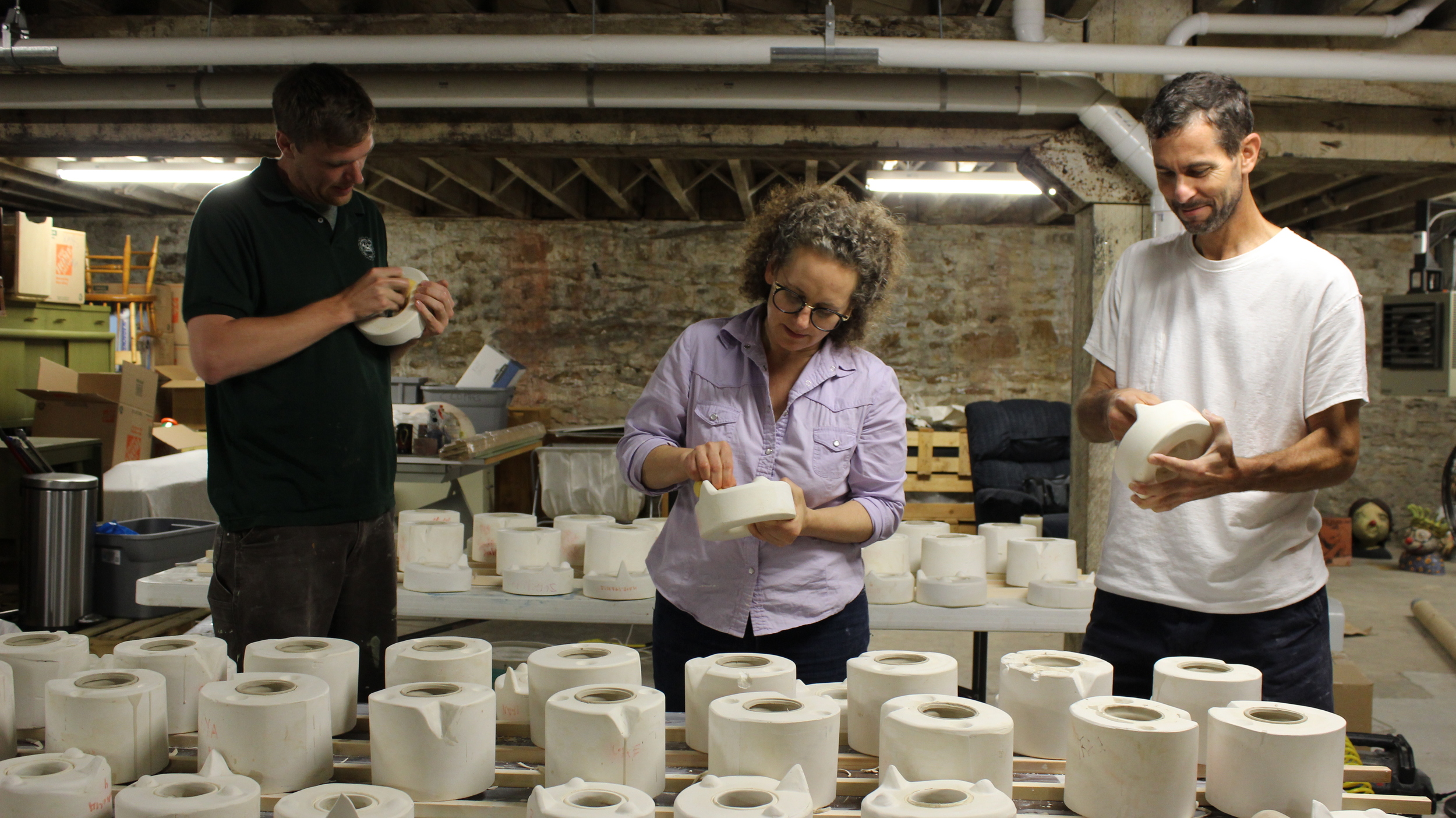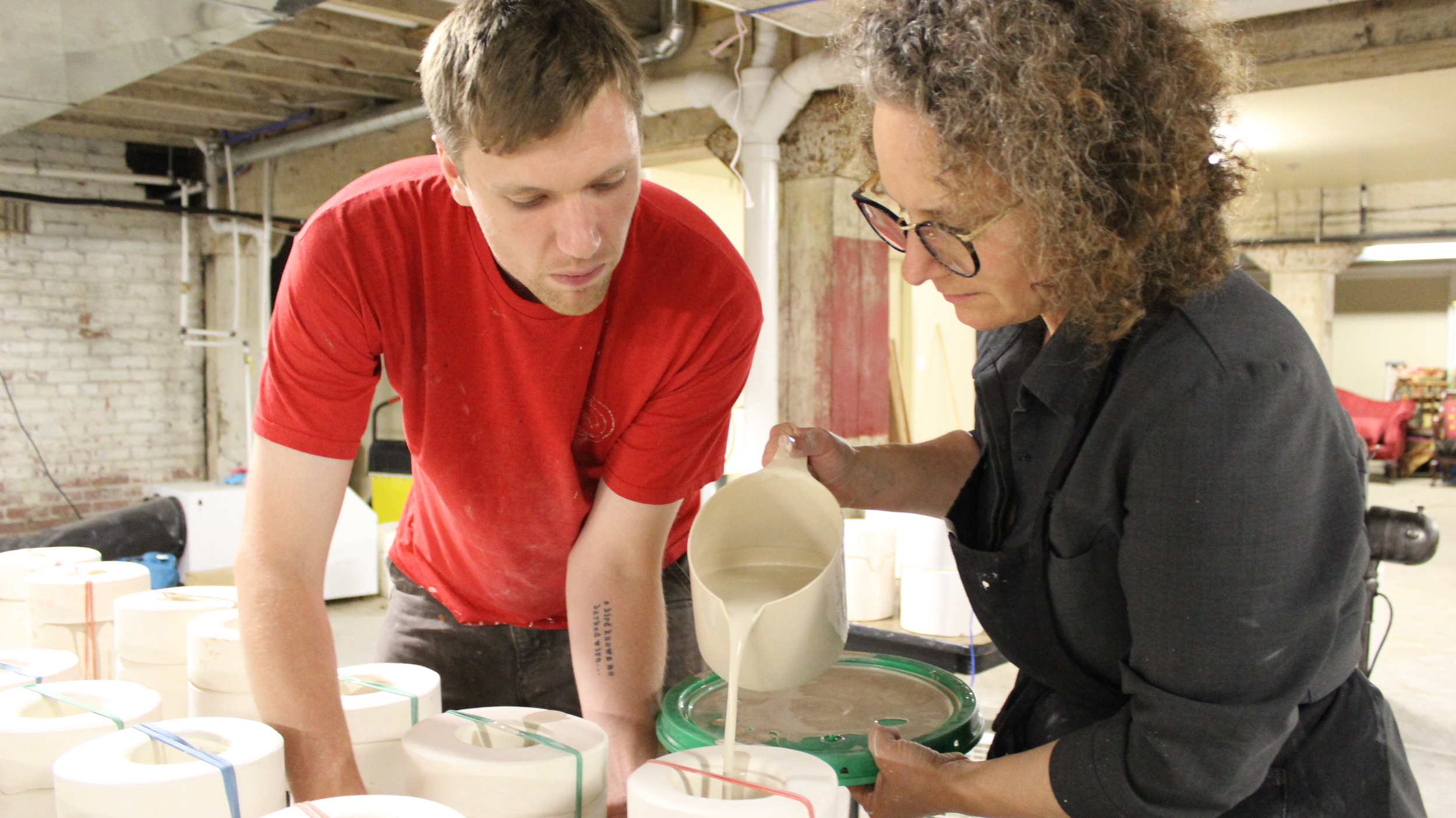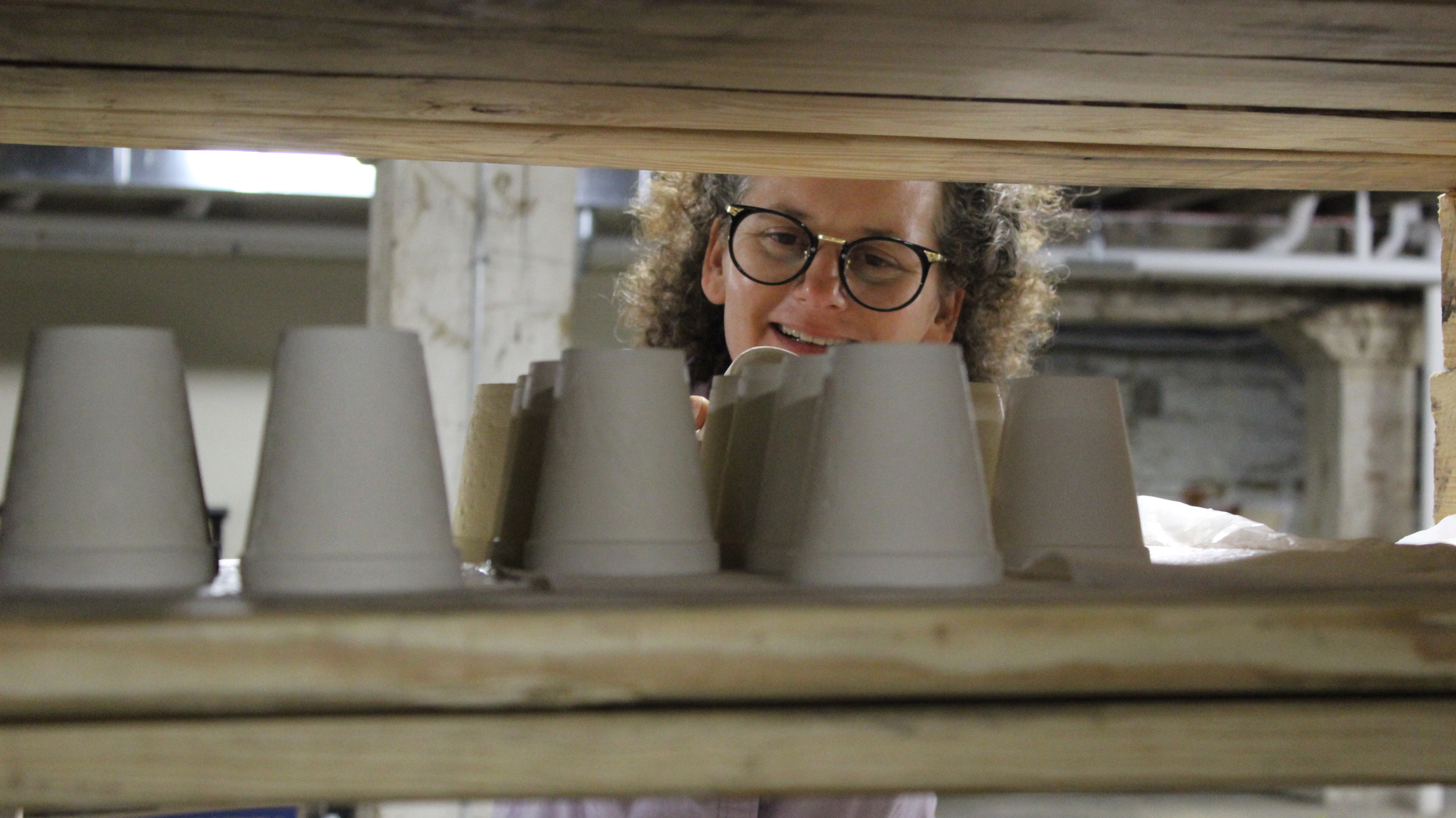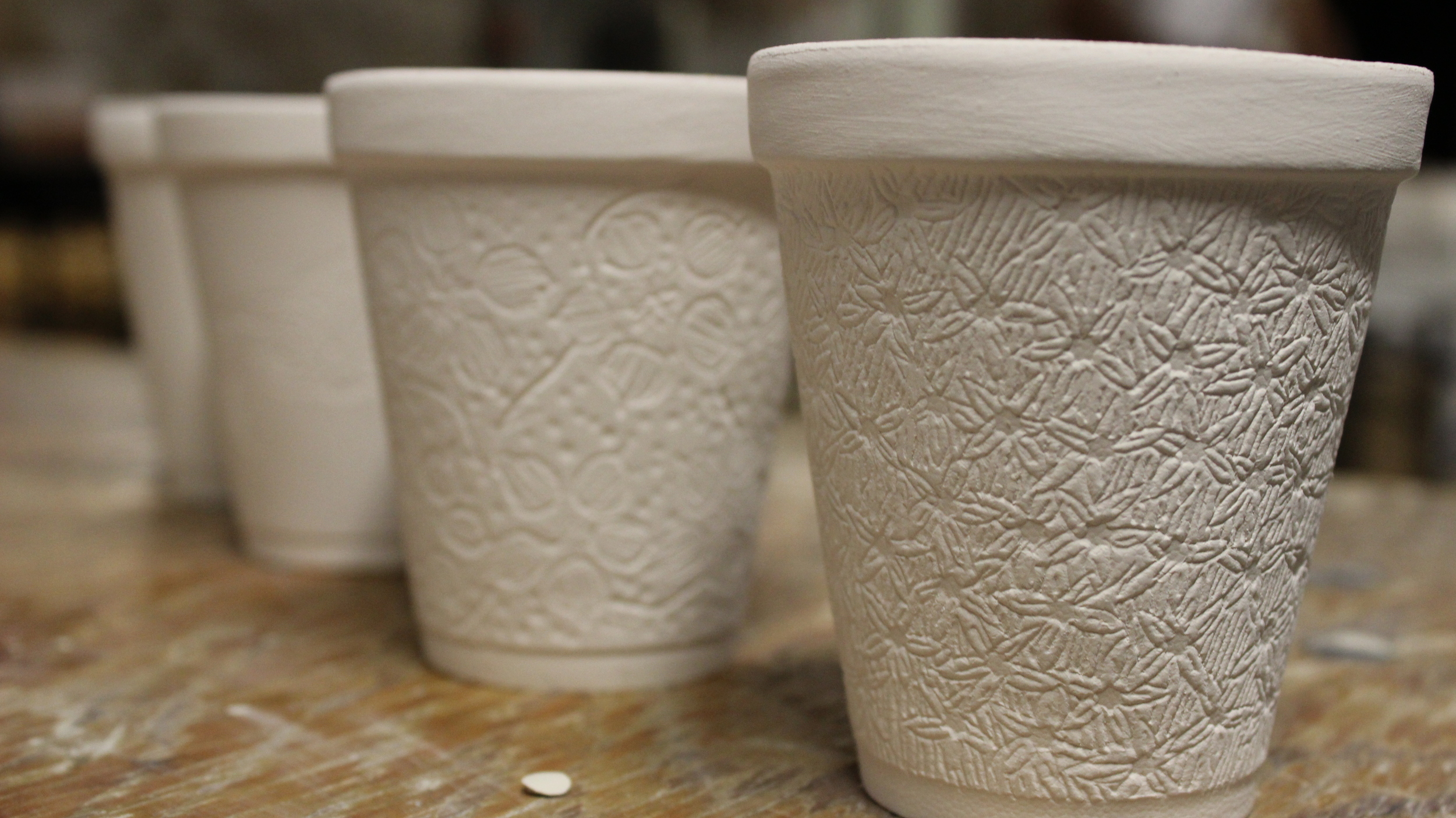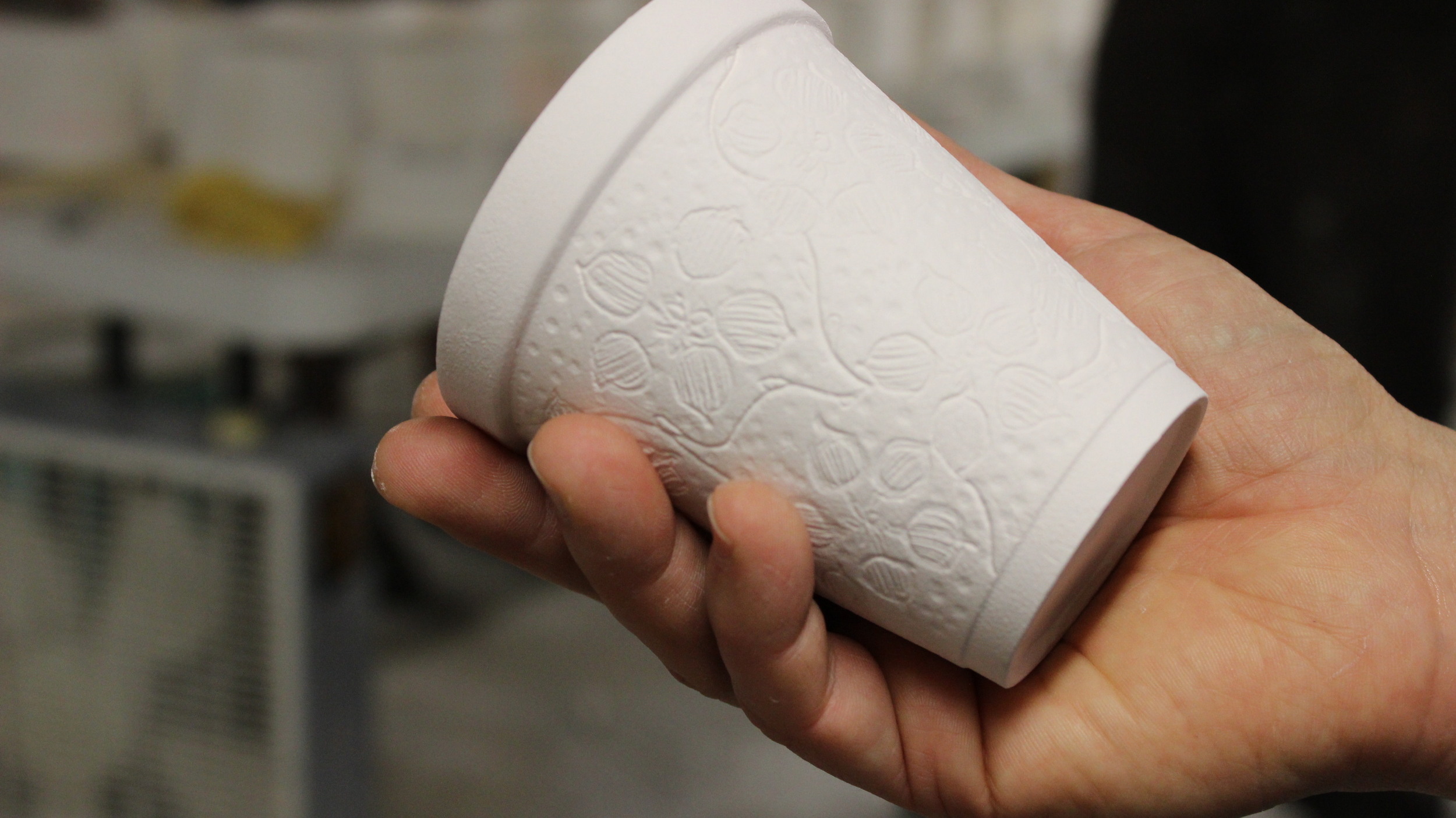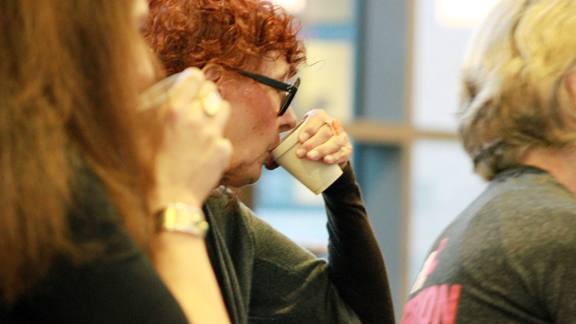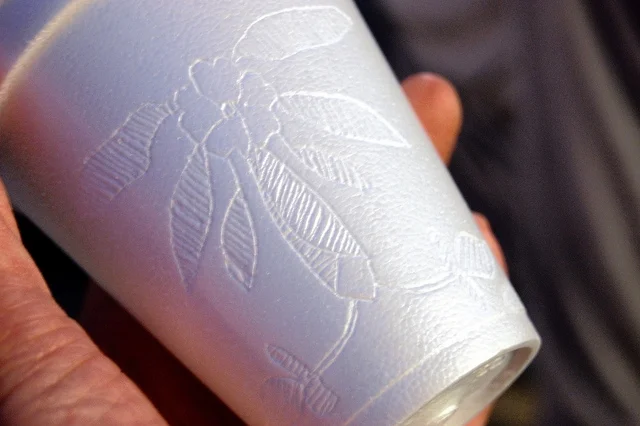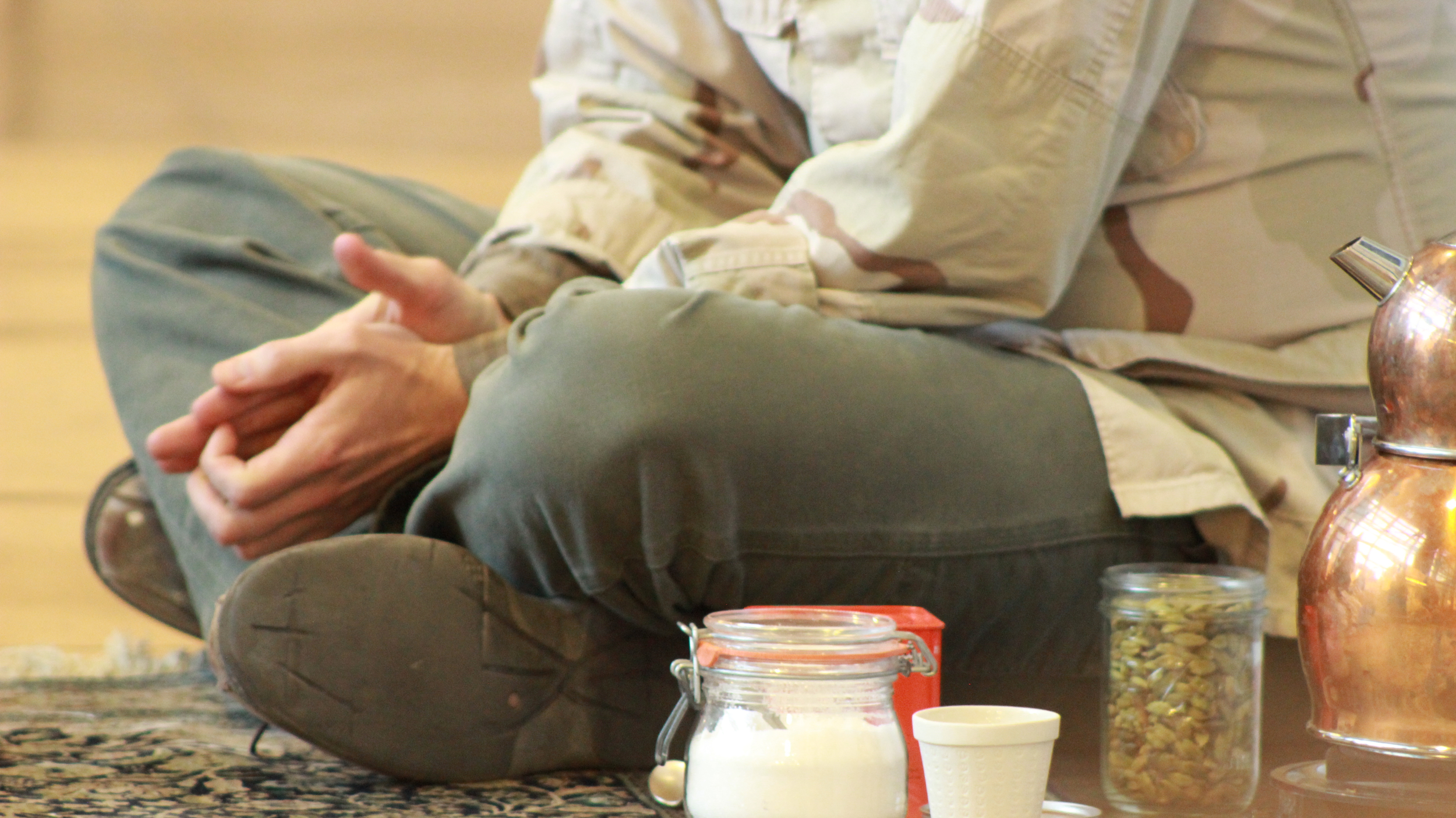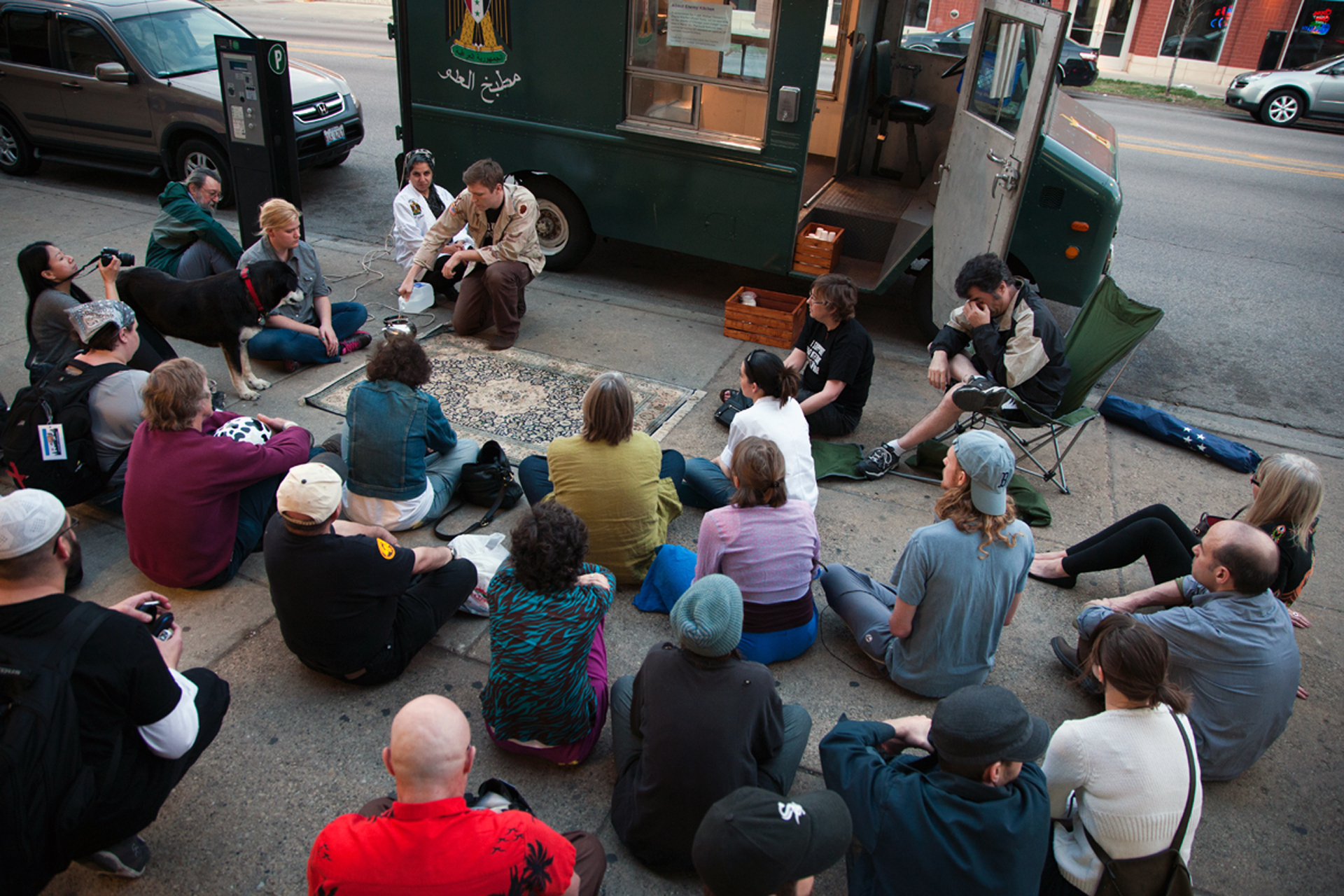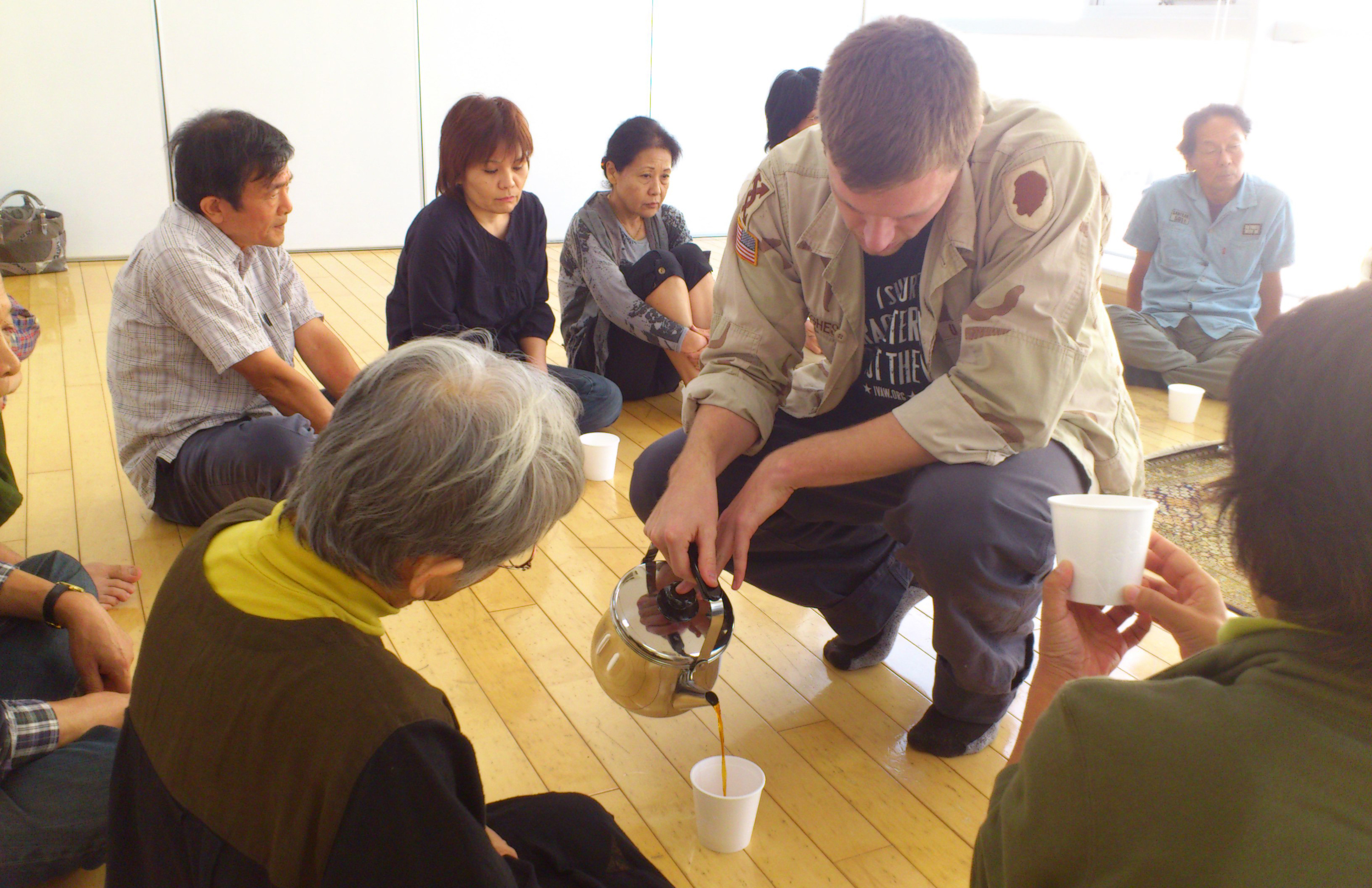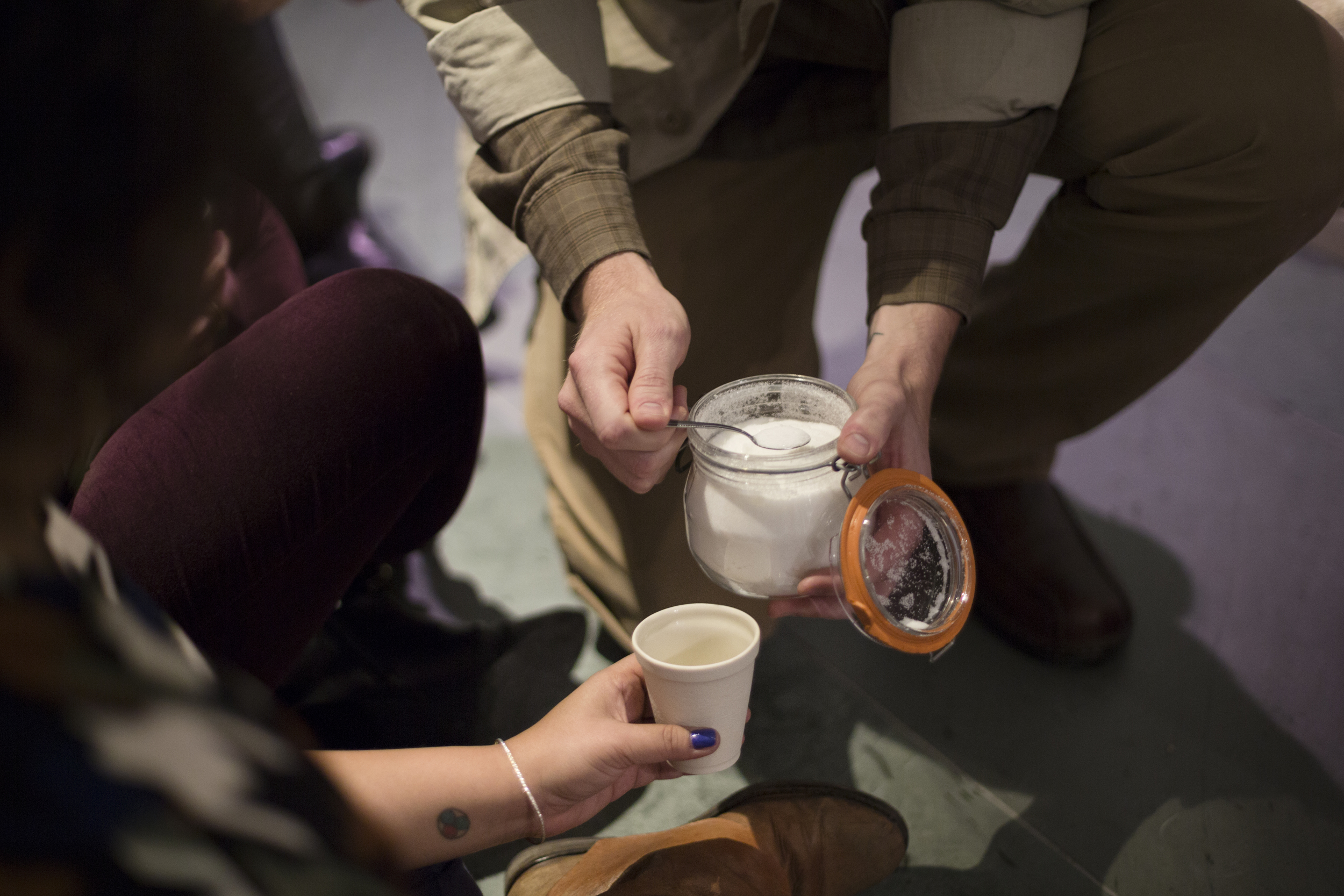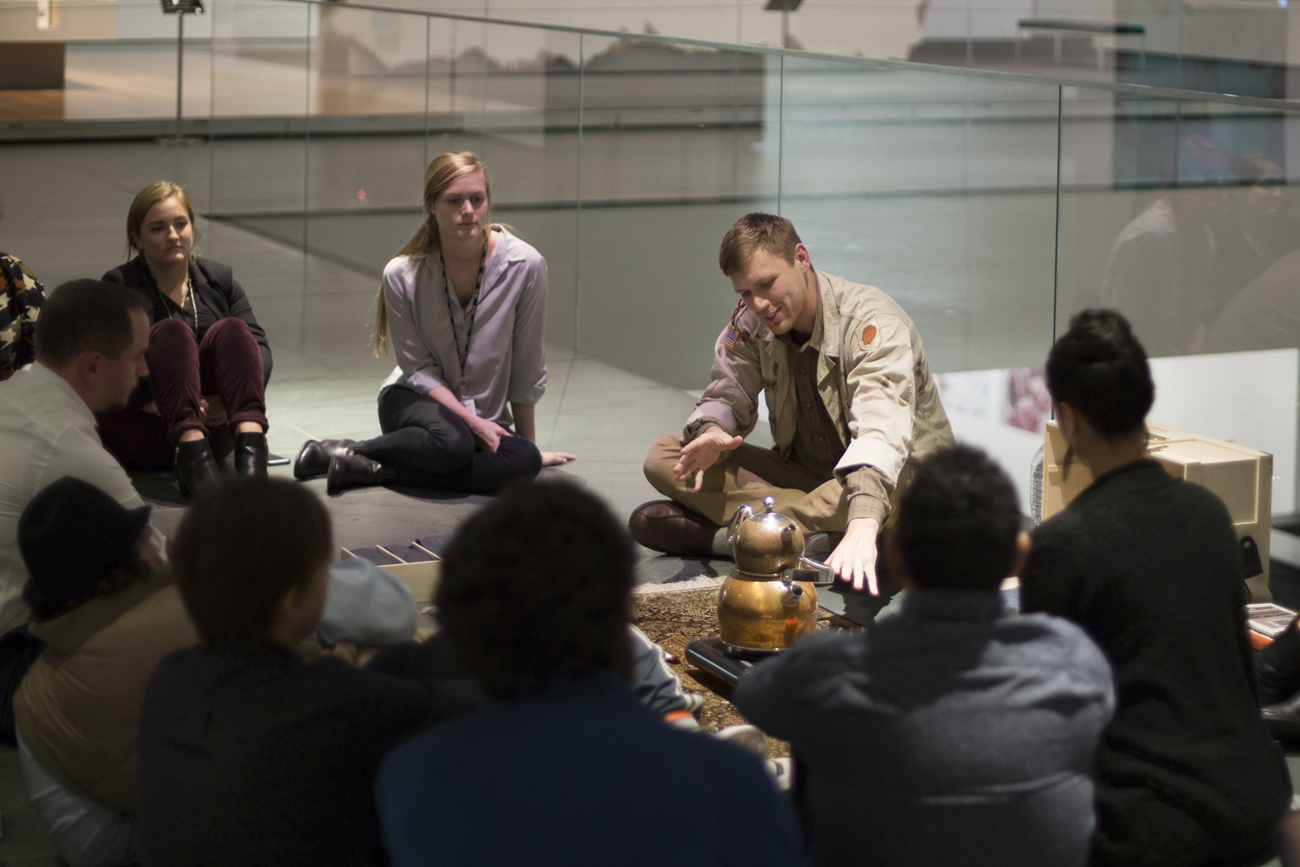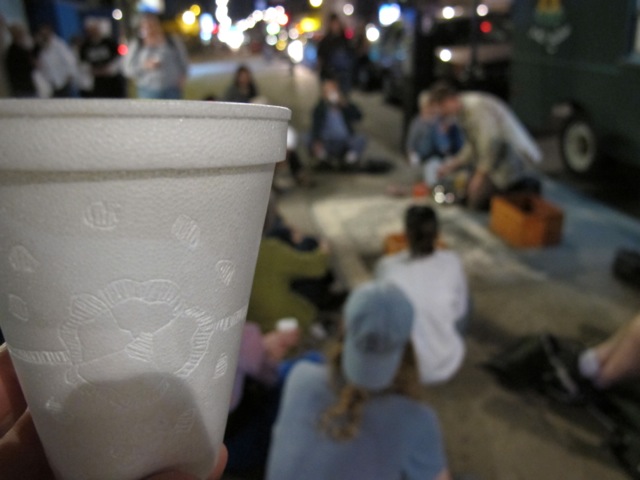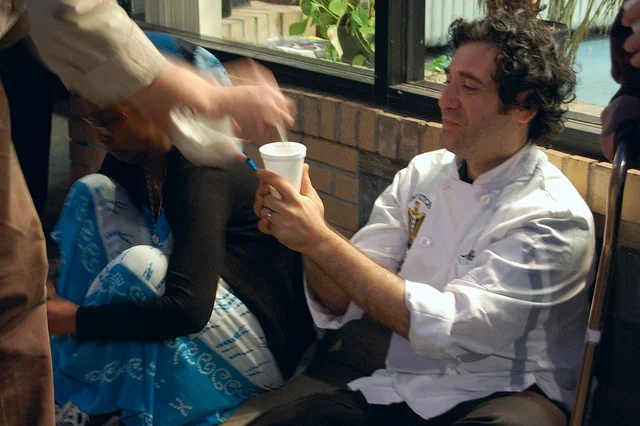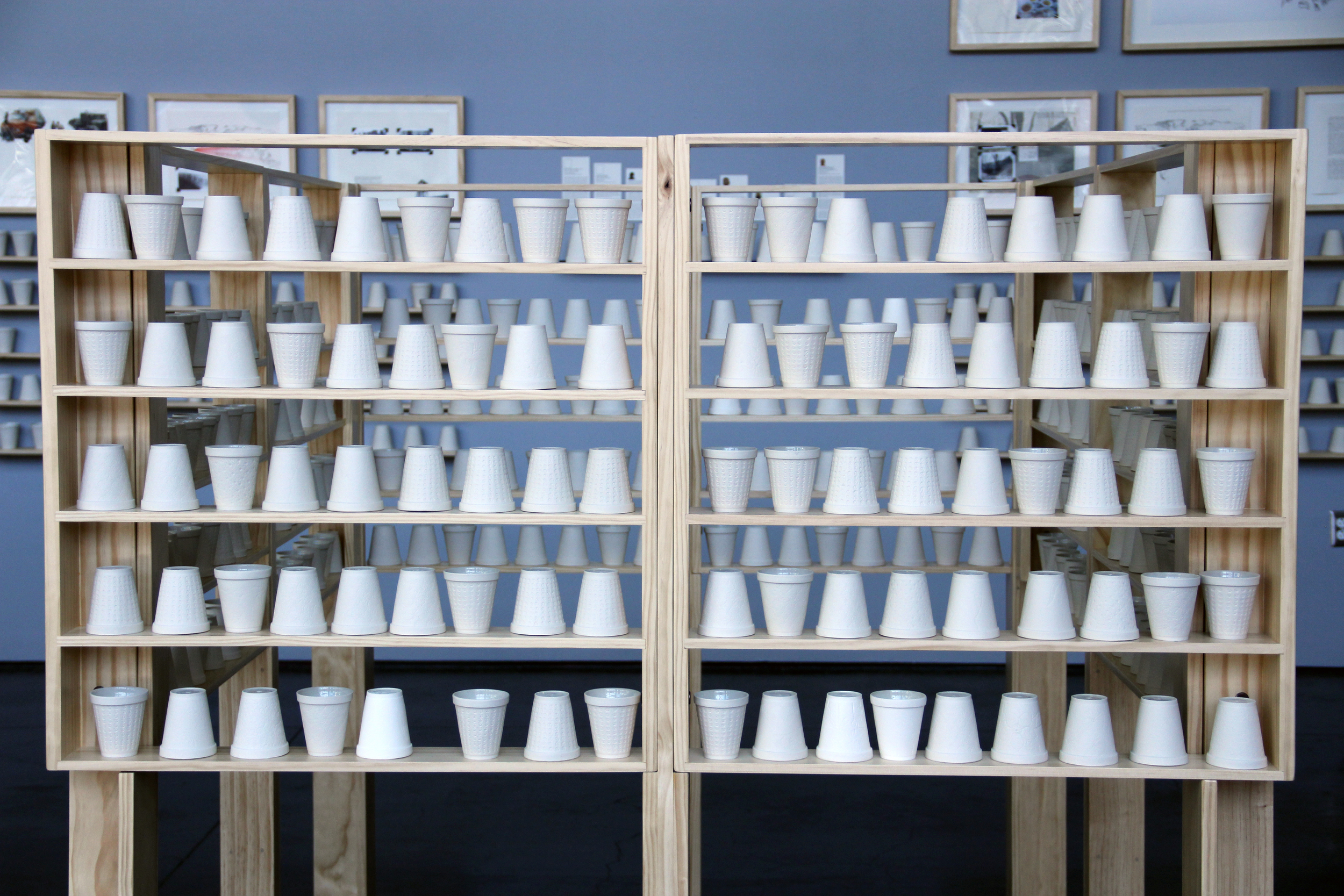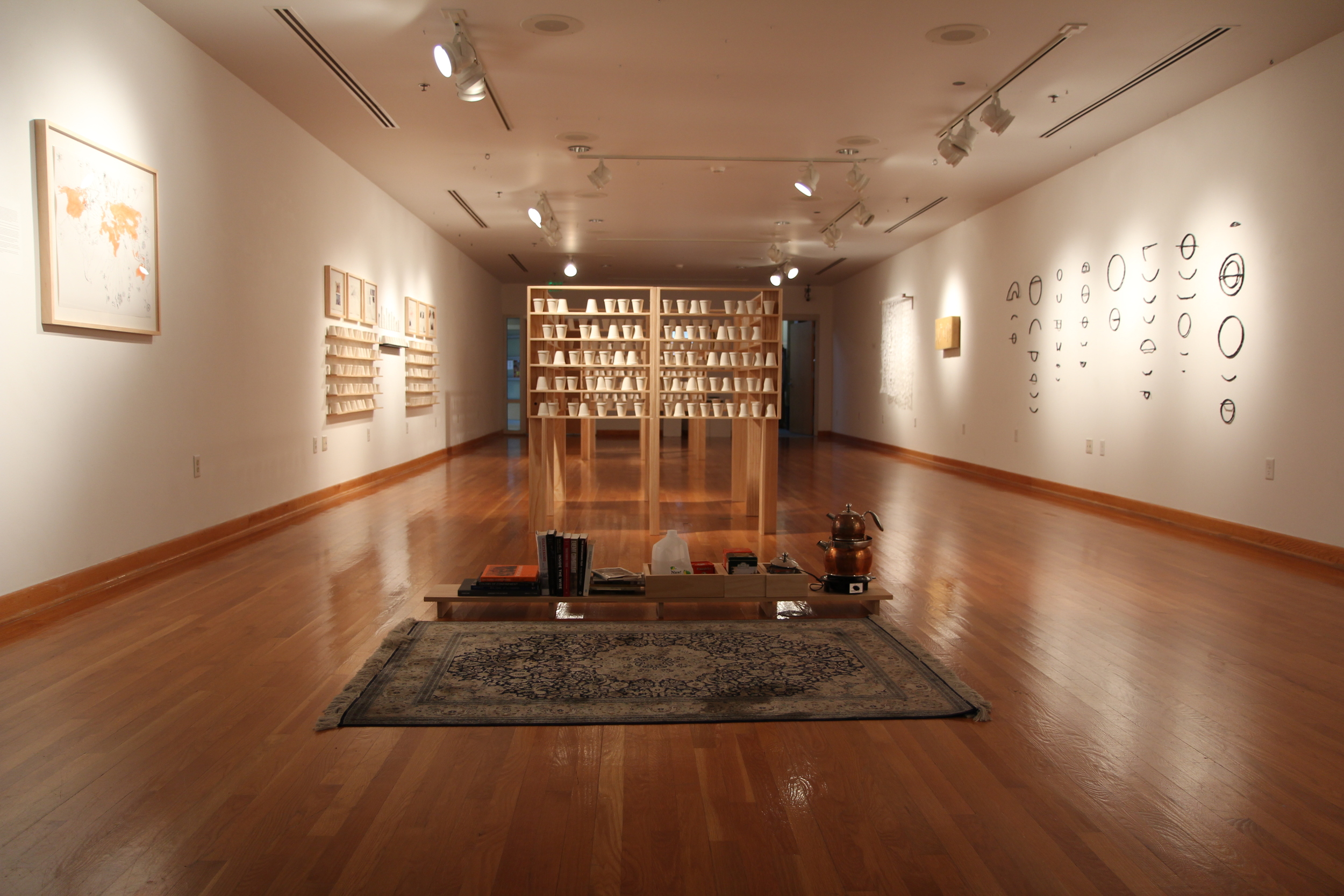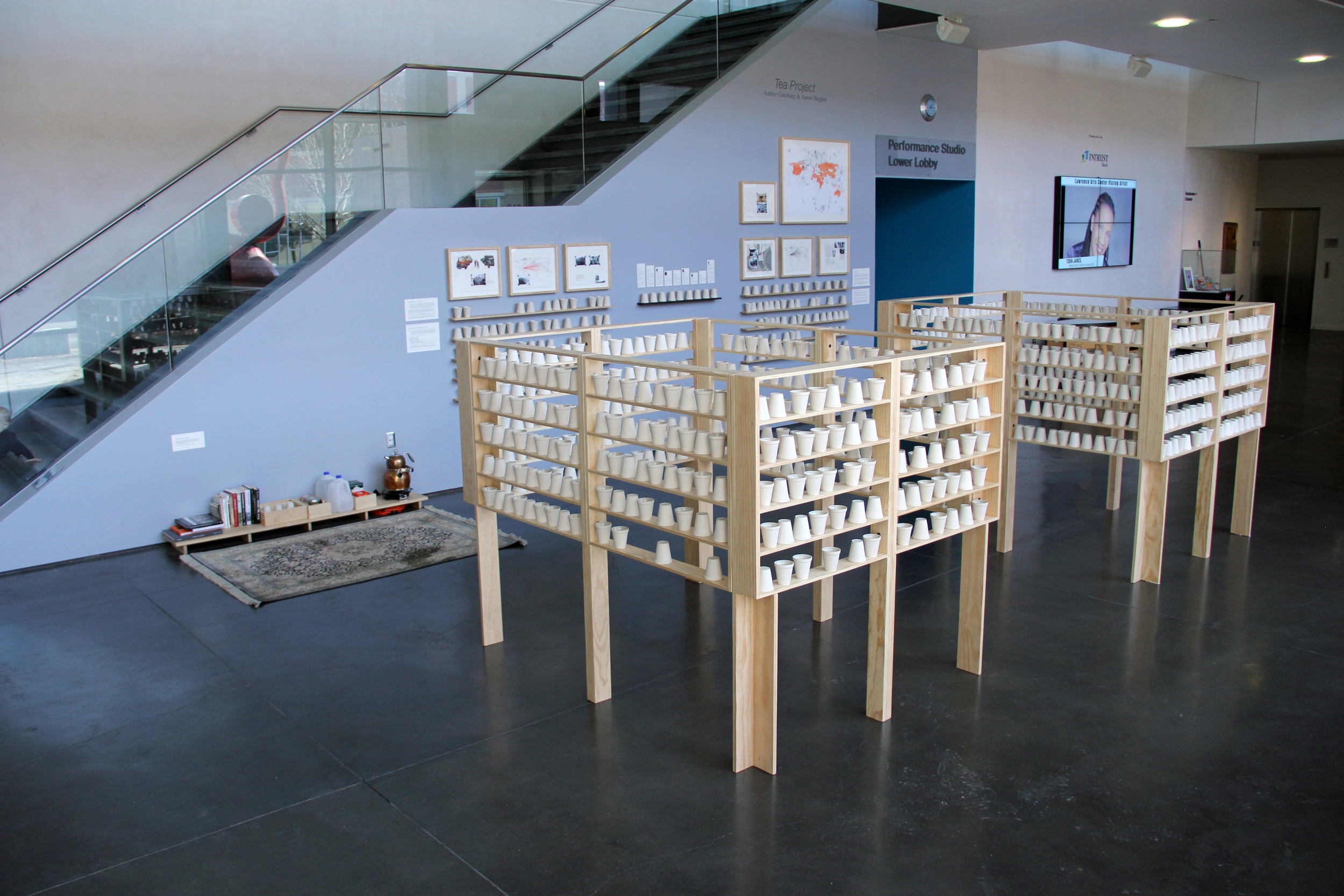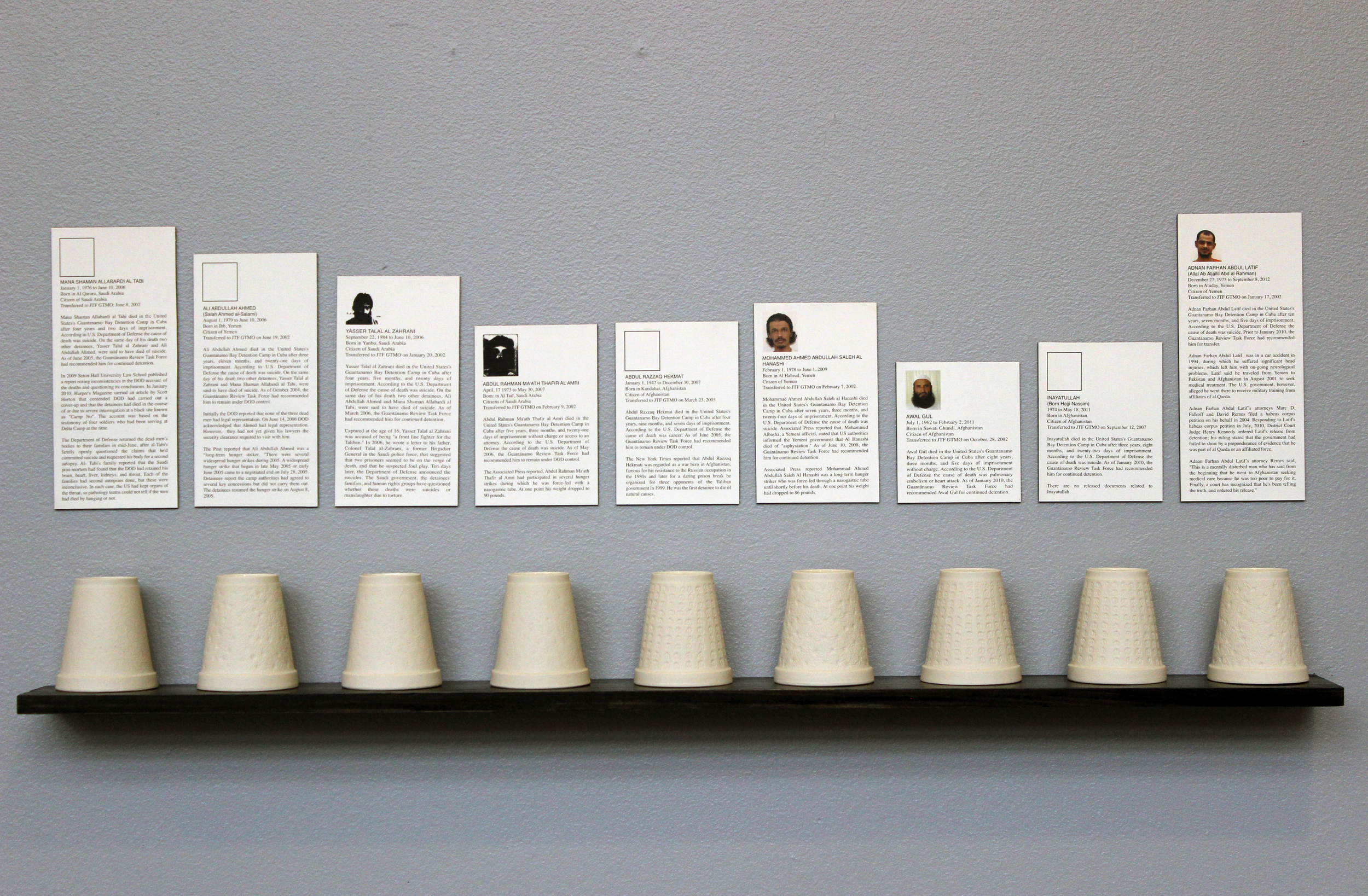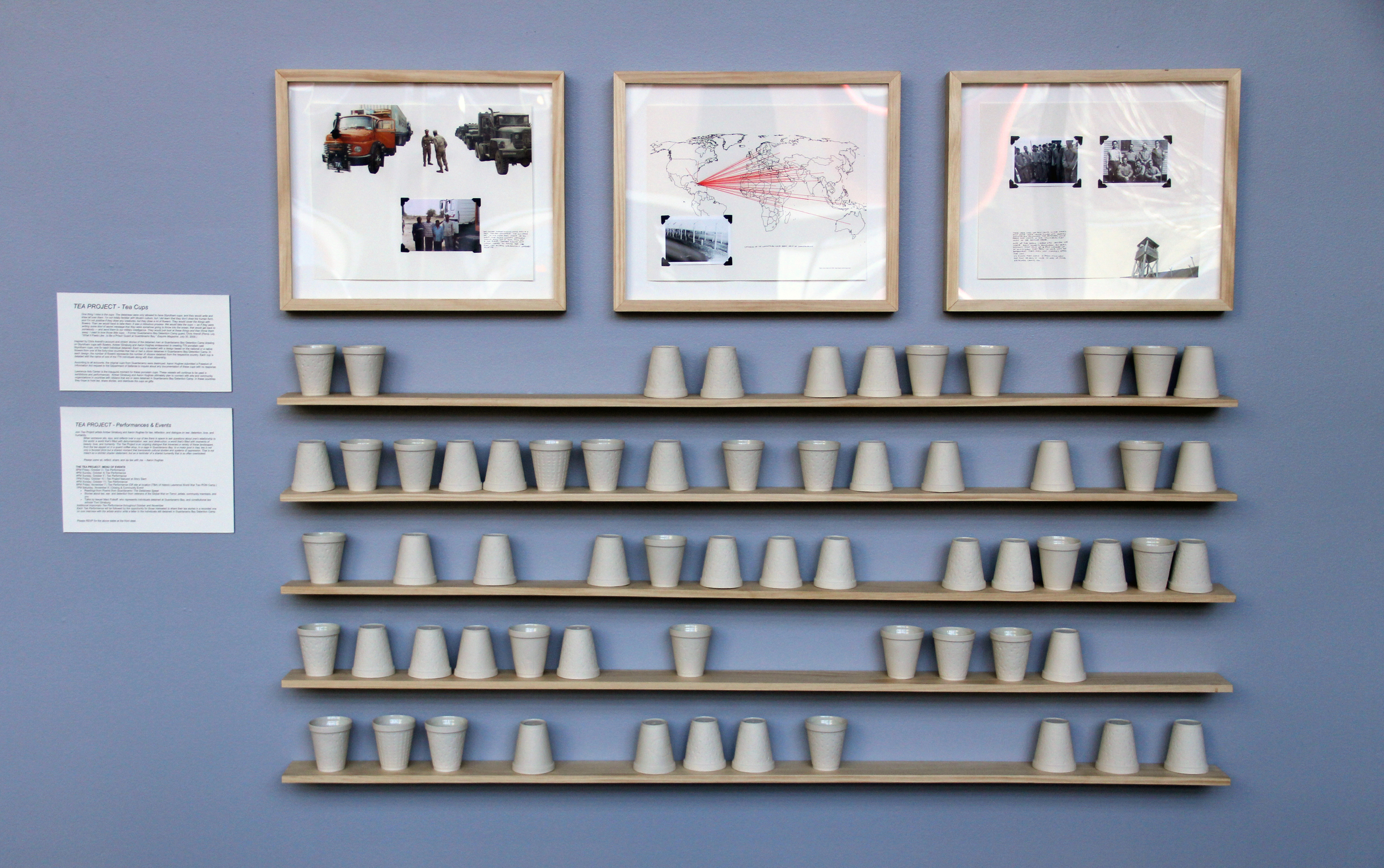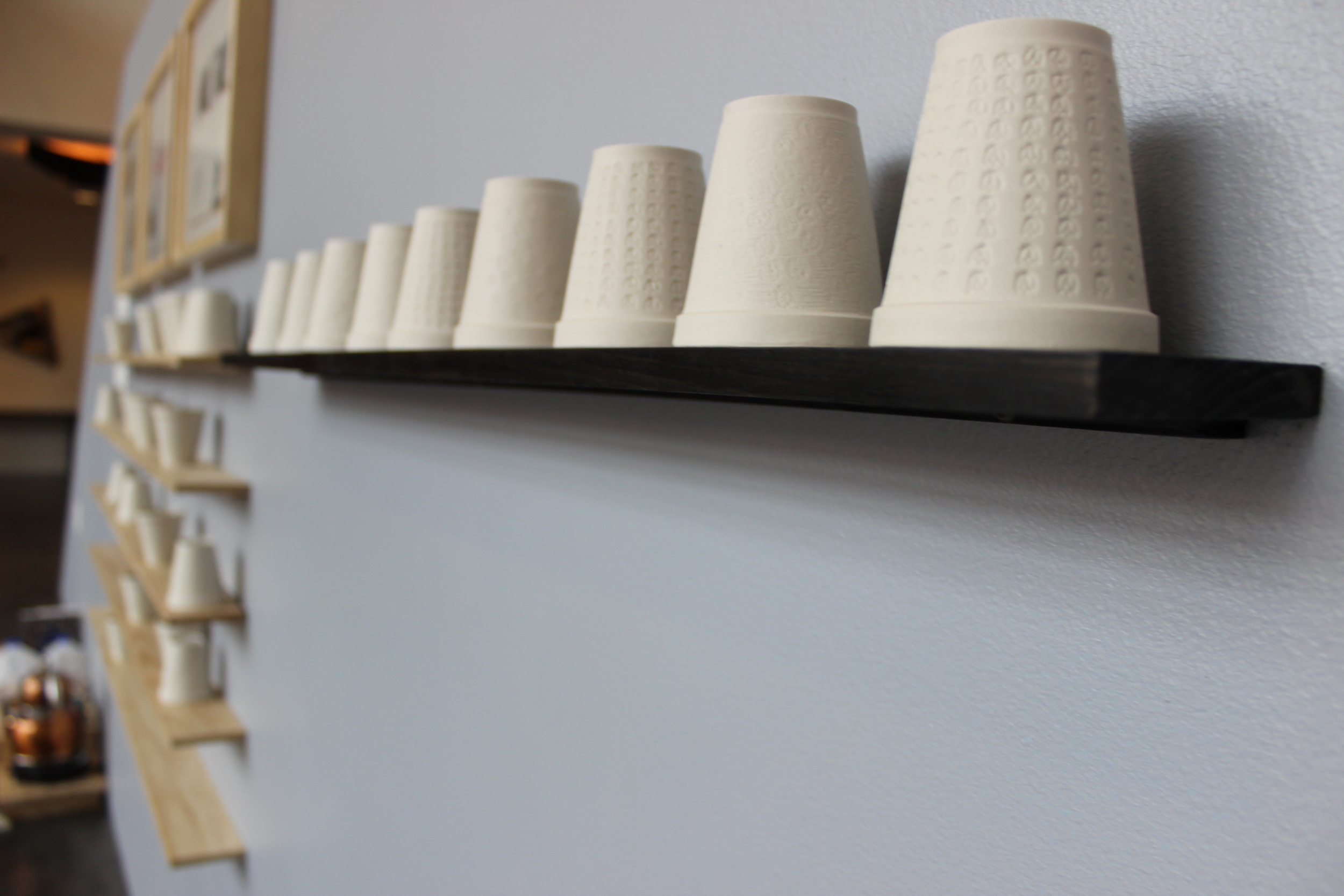












Tea Project
Tea Project
The Tea Project is an ongoing dialogue that traverses a variety of landscapes. From the tea sipped at a family gathering, to a cage in Guantanamo Bay, to a motor pool in Iraq, tea is not only a favored drink but a shared moment that transcends cultural divides and systems of oppression. When someone sits, sips, and reflects over a cup of tea there is space to ask questions about one’s relationship to the world: a world that is filled with dehumanization, war, and destruction; a world that is filled with moments of beauty, love, and humanity.
Above Image: "Tea Performance MoMA NYC." Photograph by Beatriz Meseguer.

Despite
Despite
The missions would roll to a halt. The day would end. The sun would set.
In the motor pool where we all slept, the third country nationals would roll out a rug, pull out a hot plate, and warm water to make tea.
Tea was always generously offered despite…
Above Image: "Third Country Nationals in Iraq" 2003. Photograph by Aaron Hughes.

Trivia
Trivia
Would you like to know some trivia?
That is how all of this started. The photographs. The tea. An old woman turns to me on the bus and asks, would you like to know some trivia?
So I said, Of course I would like to know some trivia.
Well, she said, when I was a young girl… Do you know the stables back that way?
Yes of course they give pony rides for children on Sundays.
Well when I was a young girl in high school, my girlfriends and I would go horseback riding from that stable. And, do you know the buildings that are back up in the forest preserve that way?
No. I did not know there were buildings in the forest preserve.
Yes, well when I was a young girl it was a POW camp and there were all these young beautiful German boys in the camp. It was a work camp and so they were strong and handsome. And, well, my girlfriends and I would ride our horses over to the camp and blow them kisses.
Why did she tell me this story… this bit of trivia? Actually, that’s what started all of this. I can’t understand why she told me this story. Was it just chance? Did I remind her of something? Did she somehow know? Did I remind her of a German prisoner of war? A German soldier?
Do I remind you of a German soldier?
Above Image: "World War Two German POWs in the United States" Photograph source unknown.

Apologize
Apologize
I did research on those camps. Turns out there were over 600 POW camps in the States. Most were work camps filled with German and Italian prisoners. The one down the road from my mom’s house was called Skokie Valley POW Camp. The prisoners would farm and work in the orchards that used to be around here. They even built a chapel on the old Glenview Naval Air Base near where I grew up.
One of the books I read was called “We Were Each Other’s Prisoners” and told the story of a prisoner in a Michigan camp who fell in love with an American girl. They even got married after the war.
It’s funny that my good friend Chris is from Michigan and that he fell in love in one of those detainee camps too …
How to Become a Concentration Camp Guard Without Even Trying… that’s what Chris said about it all.
I know Chris liked working night shifts, because whenever they were awake, he wanted to apologize to them. When they were sleeping, He didn’t have to worry about it. He could just walk up and down the blocks all night long.
He fell in love… He missed the cups.
Above Image: Photograph by Chris Hondros. (Baghdad, Iraq. July 19, 2007) [Young Iraqi detainees wait to be transferred to another facility outside an Iraqi government holding pen on July 19, 2007 at Forward Operating Base Justice, a joint US-Iraqi base in Baghdad, Iraq. Nearly a thousand "detainees" are held in a series of rooms at the detention center, in an area intended to temporarily hold 300. Many have been held for months without trials or hearings. A human-rights observer employed by the U.S. government has repeatedly complained about the conditions, with problems including overcrowding, intermittent meals, backed up sewage, and long-term detentions in a short-term facility, but conditions have remained the same.]

Little Styrofoam Cup
Little Styrofoam Cup
One thing I miss is the cups. The detainees were only allowed to have Styrofoam cups, and they would write and draw all over them. I’m not totally familiar with Muslim culture, but I did learn that they don’t draw the human form, and I’m not positive if they draw any creatures, but they draw a lot of flowers. They would cover the things with flowers. Then we would have to take them. It was a ridiculous process. We would take the cups—as if they were writing some kind of secret message that they were somehow going to throw into the ocean, that would get back to somebody—and send them to our military intelligence. They would just look at these things and then throw them away. I used to love those little cups.—Former Guantanamo Bay Detention Camp guard, Chris Arendt in Lily Pierce’s “What It Feels Like...to Be a Prison Guard at Guantánamo Bay.” Esquire Magazine, July 30, 2008.
I asked Chris what he would draw on the cups if he were going to serve Arabic tea in them… He said, “I’d draw flowers for sure… Islamic designs… it’s tough to say.”
Regardless, I know I would like to have Arabic tea in one of those cups along the river—whether it is the north branch of the Chicago or the Euphrates where I dreamed of how connected it all is; the Euphrates to the gulf to the oceans to the rivers to home.
Above Image: “Chris Arendt & Former Detainee Jarallah Al-Marri: Jarallah Al-Marri picked up the little styrofoam cup on the table and nudged Chris. “Look, look!” he said and Chris laughed—it was identical to the ones from Guantanamo.” Photograph by Sarah Mirk Guantanamo Voices, "Styrofoam Flowers," January 16, 2009.

Teacups
Teacups
Inspired by Chris Arendt’s account and others’ stories of the detained men in the Guantanamo Bay Detention Camp drawing flowers on Styrofoam cups, Amber Ginsburg and Aaron Hughes endeavored to create 779 porcelain cast Styrofoam teacups, one for each individual detained. Each teacup is detailed with the name of one of the 779 individuals along with their country of citizenship. These cups are decorated with a floral design based on the national or native flowers from the detainee’s country of citizenship. There are forty-nine countries that have or had a citizen detained in Guantanamo. In each country’s floral design, the number of flowers represents the number of citizens detained from the respective country. The cups are a lasting collection of artifacts reflecting global conflict while also being individual vessels that are easily lifted out of display and into your hands for a cup of tea.
According to all accounts, the original cups from Guantanamo were destroyed. Aaron Hughes submitted a Freedom of Information Act request to the Department of Defense to inquire about any documentation of these cups with no response.
Amber Ginsburg and Aaron Hughes ultimately plan to connect with arts and community organizations in countries with citizens that are or were detained in Guantanamo. In these countries they hope to host tea, share stories, and distribute the cups as gifts.
Above Images: "During a 2014 Lawrence Arts Center Project Based Artist in Residency Aaron and Amber along with many incredible volunteers opened a cup factory to produce 779 porcelain styrofoam cups." Photographs by Marlo Angle.

Performances
Performances
A performance and discussion that explores war, detention, love, and tea. Tea Performances utilize the space created when someone sits, sips, and reflects over a cup of tea to ask questions about one’s relationship to the world: a world that’s filled with dehumanization, war, and destruction; a world that’s filled with moments of beauty, love, and humanity.
Selected Performances
Kala Art Institute, Berkeley, CA. 2018.
Museum of Contemporary Art Chicago, Chicago, IL, 2017.
Expergiscimini: Waking Up, Idyllwild Arts Academy, Idyllwild, CA, 2017.
EXPO CHICAGO in conjunction with Human Wrights Watch, Chicago, IL, 2017.
Weinberg/Newton Gallery, Chicago, IL, 2017.
Material Histories: Cultures of Resistance, Ohio University School of Art & Design, Athens, OH, and the Majestic Gallery, Nelsonville, OH, 2017.
University of Texas San Antonio, TX, 2017.
Not Alone, San Francisco Arts Commission, San Francisco, CA, 2017.
The Dirty Canteen: Contemporary Art Made by Veterans, College of the Redwoods, Eureka, CA, 2016.
Forgotten Wars & Flowers, University of Wisconsin Parkside, Kenosha, WI, 2016.
Iowa Tea Tour, Islamic Center of the Quad Cities, Mother Mosque of America, & PEACE Iowa, 2016.
Arts Circle Celebration, Northwestern University, Evanston, IL, 2016.
Links Hall, Chicago, IL, 2016.
Art & Other Tactics, San Francisco Museum of Craft and Design, San Francisco, CA, 2016.
Tea & Darkness, Clearing Barrel, Kaiserslautern, Germany, 2015.
Tea & Darkness, NWE Vorst Theater, Tilburg, Holland, 2015.
Tea & Darkness, Haus der Kulturen der Welt, Berlin, Germany, 2015.
Tea & Darkness, BAIZ, Berlin, Germany, 2015.
Karşı Sanat, Istanbul, Turkey, 2015.
Border Free Community Center, Afghan Peace Volunteers, Kabul, Afghanistan, 2015.
Artist Experiment, Museum of Modern Art, New York, NY, 2015.
Ceramic Research Center, Arizona State University Art Museum, Tempe, AZ, 2015.
The Uncertainty of a Life in Security, University of Texas San Antonio, TX, 2015.
IVAW Convention, Ocoee, TN, 2015.
Art & Other Tactics, Craft and Folk Art Museum, Los Angeles, CA, 2015.
The Imaginists, Santa Rosa, CA, 2015.
A Lived Practice, Sullivan Gallery, School of the Art Institute of Chicago, Chicago, IL, 2014.
Lawrence Arts Center, Lawrence, KS, 2014.
Reconnaissance, Headlands Center for the Arts, Fort Barry, CA, 2014.
Performing Tableware, University of Chicago, Chicago, IL, 2013.
Open Engagement, Portland, OR, 2013.
Ashkal Alwan: The Lebanese Association for Plastic Arts, Beirut, Lebanon, 2013.
Maruki Gallery, Tokyo, Japan, 2012.
Milo's Palace, (In conjunction with Feast & Enemy Kitchen at the Smart Museum), Chicago, IL, 2012.
Lycoming College Art Gallery, Lycoming, PA, 2010.
MFA Thesis Show, Block Museum, Evanston, IL, 2009.
2,191 Days and Counting, Powerhouse Arena, Brooklyn, NY, 2009.

Installations
Installations
Selected Installations
Edgewood College Gallery, Madison, WI, 2018.
Turning Tales, Kala Art Institute, Berkeley, CA. 2018.
Material Histories: Cultures of Resistance, Ohio University School of Art & Design, Athens, OH, and the Majestic Gallery, Nelsonville, OH, 2017.
EXPO CHICAGO in conjunction with Human Rights Watch, Chicago, IL, 2017.
E Pluribus: Reflections on the Anniversary of 9/11, Center for the Visual Arts Gallery, Kent State University, Kent, OH, 2017.
Tea Project with Ghaleb Al-Bihani & Djamel Ameziane, George Washington University, Corcoran Gallery, Washington, DC, 2017.
E Pluribus: Reflections on the Anniversary of 9/11, Silent Funny, Chicago, IL, 2016.
Forgotten Wars & Flowers, University of Wisconsin Parkside, Kenosha, WI, 2016.
Arts Circle Celebration, Northwestern University, Evanston, IL, 2016.
E Pluribus: Reflections on the Fifteenth Anniversary of 9/11, UNUM, Chicago, IL, 2016.
Art & Other Tactics, Museum of Craft & Design, San Francisco, CA, 2016.
Tea Project, Links Hall, Chicago, IL, 2016.
Art & Other Tactics, Craft and Folk Art Museum, Los Angeles, CA, 2015.
The Imaginists, Santa Rosa, CA, 2015.
Emergency/Emergence: Art After War, Merced County Arts Council in conjunction with the University of California, Merced, CA, 2015.
Converse, Indiana University Northwest, Gary, IN, 2014.
Tea Project, Lawrence Arts Center, Lawrence, KS, 2014.
Reconnaissance, Headlands Center for the Arts, Fort Barry, CA, 2014.
Tea: History and Vulnerability, Lycoming College Art Gallery, Lycoming, PA, 2010.
MFA Thesis Show, Block Museum, Evanston, IL, 2009.
2,191 Days and Counting, Powerhouse Arena, Brooklyn, NY, 2009.

Background
Background
Amber Ginsburg and Aaron Hughes work collaboratively to uncover moments of beauty, poetics and shared humanity within little known military histories. Taking as its starting point the curious love story of a Guantanamo Bay guard who fell in love with the drawings on the Styrofoam cups carved by detainees, the Tea Project is an ongoing series of exhibitions and performances that offers counter-narratives to disrupt the numbing effects of war and detention. Through the Tea Project, Ginsburg and Hughes create scenarios that allow audiences a role in telling the story of our current involvement in war and torture.

Project History
Project History
Artists and Iraq War veteran Aaron Hughes originally developed the Tea Project after a return trip to Iraq, as a civilian, in 2009. It was during this trip he had tea prepared in the Iraqi tradition for the first time. After returning home, Aaron began hosting Tea Project performances in order to draw out guests' stories connected to living during the ongoing Global War on Terror while interlacing stories of his deployment to Kuwait and Iraq in 2003, his return trip in 2009, and the curious love stories of his friend Chris Arendt, a Guantanamo Detention Camp guard, who fell in love with drawings carved by detainees into Styrofoam cups.
In 2013, Aaron Hughes invited Amber Ginsburg to join in the Tea Project in order to cast 779 porcelain Styrofoam teacups, one for each individual held in extra-legal detention since 2001. Since then, Ginsburg and Hughes have worked collaboratively to expand the project and develop a multi-faceted forum to engage with individuals' personal relationships to love, war, and extra-legal detention.

Artists Biographies
Artists Biographies
AMBER GINSBURG | amberginsburg.com
Together with collaborators, Amber Ginsburg creates site-generated projects and social sculpture that insert historical scenarios into present day situations. Her background in craft orients her projects towards the continuities and ruptures in material, social, and utopic histories. She teaches in the Department of Visual Arts at the University of Chicago.
Her research-based multimedia installations have been shown in museums and galleries including: Museum of Contemporary Art, Chicago; The Soap Factory, Minneapolis, MN; The Society for Contemporary Craft, Pittsburg, PA; World Ceramic Biennale, Korea; KunstTREFFpunkt, Darmstadt, Germany; Artsonje, Seoul, Korea; Raid Projects, Los Angeles, CA and the Bristol Biennial, England.
AARON HUGHES | aarhughes.org
Aaron Hughes is an artist, activist, organizer, teacher, and Iraq War veteran, whose work seeks out poetics, connections, and moments of beauty, in order to construct new languages and meanings out of personal and collective traumas. He uses these new languages and meanings to create projects that deconstruct systems of dehumanization and oppression.
He works with a variety of art, veteran, and activist organizations and projects including: Warrior Writers Project, Dirty Canteen, National Veterans Art Museum, Iraq Veterans Against the War, Justseeds Artists’ Cooperative, and Center for Artistic Activism. He has shown his work throughout the United States and internationally in museums and galleries to include: Museum of Modern Art, New York; The Maruki Gallery, Tokyo, Japan; School of Visual Arts Museum, New York, NY; Open Engagement, Portland, OR; Ashkal Alwan, Beirut, Lebanon; Craft and Folk Art Museum, Los Angeles, CA; The Milwaukee Art Museum, Milwaukee, WI; among other locations. He received The Claire Rosen and Samuel Edes Foundation Prize for Emerging Artists for his work on the Tea Project.

Bibliography
Bibliography
Ajello, Linell. "More and More War Stories." Guernica, February 8, 2016.
Avila, Rob. "Artist, Iraq War Vet Aaron Hughes Drinks Tea and Talks Peace." KQED, May 21, 2015.
Combs, Gretchen. "In a Tea Ritual, Stopping Time and Reflecting on War with a Veteran." Hyperallergic, February 5, 2016.
Chu, Louisa. “Talking Tea with the Enemy.” WBEZ, May 17, 2012.
Hussain, Aliya. "Tea and the power of conversation." Center for Constitutional Rights Blog, April 14, 2016.
James, Marsha. "In a Cup of Tea, Hope." Voice of America, August 30, 2018.
Kelly, Kathy. “Visits & Conversations in Kabul.” Voice for Creative Nonviolence Blog, January 2, 2016.
Kelly, Kathy. “Flowers from Guantanamo.” Common Dreams, December 21, 2015.
Grant, Jean. “A Cup of Tea.” Friends Journal, August 1, 2015.
Pentilla, Annie. “Creating Meaning Out of Trauma: Iraq War Veteran Aaron Hughes Turns to Art.” Tikkun Daily Blog, May 23, 2014.
Seely, Thomas. “The Tea Project.” Art Uncovered, BTRToday, April 5, 2016.
Smith, Stephanie. Feast: Radical Hospitality in Contemporary Art. Chicago: Smart Museum of Art, The University of Chicago Press, 2013, 300-305.
Smith, Stephanie. Institutions and Imaginaries: Chicago Social Practice History Series. The University of Chicago Press, 2015.
Shouse, Heather. “Enemy Kitchen: A new food truck serves Iraqi food and employs U.S. veterans of the Iraq War. - Now that is something to chew on.” Time Out Chicago, February 8, 2012.
Templeton, David. “Tea for Two, Artist and Army Vet, Aaron Hughes, aims to break down walls.” Bohemian, May 13, 2015.
Woon, Windy. “Learning with Museums: On Place & Proximity.” MoMA Learning Blog, December 23, 2015.
